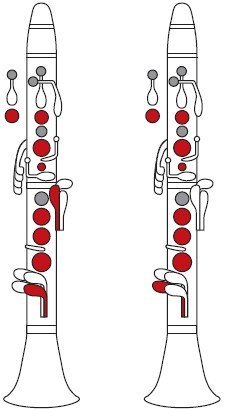When we talk about the D# Dorian scale and its fascinating role in clarinet music, it's like opening a Pandora's box of creativity and emotion! This scale, which might seem niche at first glance, has a historical significance that deserves to be unearthed. Let's take a little stroll through the annals of music history to see how the D# Dorian scale has influenced compositions and performances, particularly those featuring Martin Freres clarinets, characterized by their rich tones and sweet sounds.

Clarinet Fingering Charts are always FREE at MartinFreres.net!
Understanding the D# Dorian Scale
The D# Dorian scale comes from the B major scale, with D# as its starting note. It's a fascinating blend of minor and major sounds, creating music that's both reflective and uplifting. The F# note, which is the second in this scale, gives it that distinctive Dorian flavor. If you're already drawn to this scale, you're not alone!
Historical Significance in Clarinet Music
Throughout history, many composers have used the D# Dorian scale to express a wide range of emotions in their clarinet pieces. The scale's ability to convey clarity, vulnerability, and strength has made it a favorite among musicians. Players using Martin Freres clarinets, in particular, have shown a special knack for bringing out the scale's unique qualities.
| Era | Composers | Characteristic Use of D# Dorian |
|---|---|---|
| Classical | Beethoven, Mozart | Emotional depth in compositions |
| Romantic | Various | Improvisation and heightened emotion |
| Modern | Jazz and contemporary classical composers | Versatility in different genres |
The Classical Era
In the Classical period, giants like Beethoven and Mozart freely incorporated the D# Dorian scale into their works. They recognized how it could add emotional depth to their compositions. Imagine a musician with a Martin Freres clarinet, seated and ready to play, bringing these profound emotions to life through the D# Dorian scale. It's quite a stirring image!
The Romantic Period
The Romantic era brought a surge of improvisation and heightened emotional expression. Clarinetists began exploring scales like the D# Dorian, creating rich, romantic passages that moved audiences to tears or laughter. Every note, from the softest whisper to the boldest declaration, carried emotions that lingered long after the performance ended. The Martin Freres clarinet, known for its depth and character, became an ideal instrument for these expressive performances.
The Modern Era
Today, the D# Dorian scale continues to be a favorite in various genres, from jazz to contemporary classical music. Many modern clarinetists incorporate this scale into their improvisations. It's safe to say that jazz, in particular, owes much of its unique sound to scales like the D# Dorian.
Jazz Influence
In the world of jazz, countless musicians have left their mark using the D# Dorian scale. From swing era legend Benny Goodman to today's innovative artists, this scale has given clarinetists a powerful tool for expressing a wide range of musical ideas.
Social Impact
The D# Dorian scale has had a significant social impact, bridging gaps between composers and players from diverse cultural backgrounds and musical traditions. The warm, expressive sound of a Martin Freres clarinet makes it a popular choice for musicians looking to explore the full potential of this scale.
Emotional Power of D# Dorian
This remarkable scale, combined with the artistry of clarinet music, has a unique ability to express joy, sadness, and everything in between. It's not just about playing notes; it's about conveying feelings through those notes. Next time you pick up your Martin Freres clarinet, why not spend some time exploring the D# Dorian scale? You might be surprised where it takes you!
Practice Tips
Adding the D# Dorian scale to your practice routine can greatly improve your technique. Start slowly with long tones, then gradually work on articulating the notes. Pay attention to how the instrument vibrates as you play; it's an exhilarating experience! The combination of the D# Dorian scale and a quality Martin Freres clarinet can open up new avenues of musical expression.
Conclusion
The historical importance of the D# Dorian scale in clarinet music is undeniable. It represents a tradition that connects generations of musicians through their shared passion for innovation, emotion, and expression. The D# Dorian scale serves as a reminder of music's incredible diversity and its power to bring people together.
Table of Contents
- Understanding the D# Dorian Scale
- Historical Significance in Clarinet Music
- The Classical Era
- The Romantic Period
- The Modern Era
- Jazz Influence
- Social Impact
- Emotional Power of D# Dorian
- Practice Tips
- Conclusion








